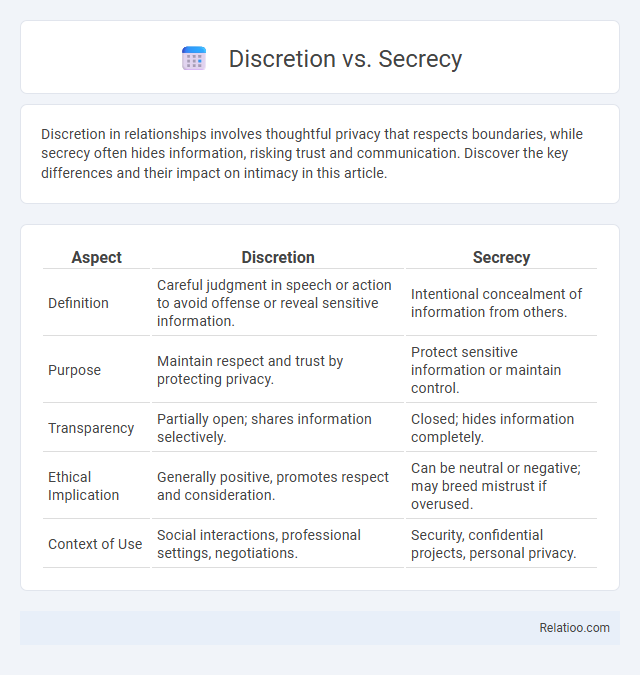Discretion in relationships involves thoughtful privacy that respects boundaries, while secrecy often hides information, risking trust and communication. Discover the key differences and their impact on intimacy in this article.
Table of Comparison
| Aspect | Discretion | Secrecy |
|---|---|---|
| Definition | Careful judgment in speech or action to avoid offense or reveal sensitive information. | Intentional concealment of information from others. |
| Purpose | Maintain respect and trust by protecting privacy. | Protect sensitive information or maintain control. |
| Transparency | Partially open; shares information selectively. | Closed; hides information completely. |
| Ethical Implication | Generally positive, promotes respect and consideration. | Can be neutral or negative; may breed mistrust if overused. |
| Context of Use | Social interactions, professional settings, negotiations. | Security, confidential projects, personal privacy. |
Understanding Discretion and Secrecy
Discretion involves careful judgment to protect sensitive information while allowing appropriate sharing, balancing transparency and confidentiality. Secrecy demands strict concealment of information from others, often to safeguard privacy, security, or competitive advantage. Your ability to discern when to exercise discretion versus maintain secrecy is crucial for effective communication and trust management.
Key Differences Between Discretion and Secrecy
Discretion involves carefully managing information to protect privacy and maintain professionalism, whereas secrecy implies deliberately hiding information to prevent others from knowing it. Your use of discretion fosters trust by balancing transparency with confidentiality, while secrecy can create barriers and suspicion. Understanding these distinctions helps you navigate sensitive situations effectively while preserving integrity and relationships.
Historical Perspectives on Privacy
Historical perspectives on privacy highlight distinct nuances between discretion, secrecy, and confidentiality as mechanisms to protect personal information. Discretion traditionally denotes cautious judgment in sharing sensitive details, often rooted in social etiquette and trust, while secrecy involves actively concealing information to prevent knowledge by others. Confidentiality emphasizes formal obligations, particularly in professional contexts, where privacy protection is institutionalized through legal and ethical codes.
The Role of Discretion in Professional Settings
Discretion in professional settings ensures sensitive information is handled with care, fostering trust and maintaining confidentiality between colleagues and clients. Unlike secrecy, which often implies withholding information for personal gain or manipulation, discretion balances transparency with ethical judgment to support effective decision-making. Your ability to exercise discretion protects organizational integrity and promotes a respectful workplace environment.
When Secrecy Becomes a Liability
Secrecy becomes a liability when it undermines trust and transparency, leading to misunderstandings and ethical issues in your organization or personal relationships. Discretion allows you to share sensitive information thoughtfully, maintaining confidentiality without breeding suspicion or harm. Balancing discretion with openness ensures responsible information management that protects both privacy and integrity.
Ethical Implications of Discretion vs Secrecy
Discretion involves making thoughtful choices about sharing information to protect privacy and respect ethical boundaries, while secrecy often entails withholding information, potentially leading to mistrust and ethical conflicts. Discretion supports transparency and accountability by balancing openness with confidentiality, whereas secrecy can foster deception and undermine ethical standards in professional and personal contexts. Ethical implications hinge on the intent and impact of information control, where discretion aligns with moral responsibility and secrecy risks breaching ethical obligations.
Discretion in Decision-Making Processes
Discretion in decision-making processes allows you to evaluate options carefully and tailor judgments based on context and specific circumstances, enhancing flexibility and responsiveness. Unlike secrecy, which withholds information to control knowledge, discretion emphasizes prudent judgment and ethical considerations without unnecessary concealment. Applying discretion ensures decisions are transparent yet respectful of privacy, balancing openness with confidentiality in organizational and personal settings.
Real-World Examples of Secrecy Gone Wrong
Secrecy often leads to significant issues when withheld information fosters mistrust, as seen in corporate scandals like Enron where hidden financial practices caused massive collapses. Discretion involves carefully managing sensitive information with ethical judgment, critical in professions like healthcare to protect patient privacy without misleading stakeholders. Your understanding of these distinctions highlights the risk of secrecy gone wrong and the value of discretion in maintaining transparency and trust in real-world scenarios.
Balancing Transparency, Discretion, and Secrecy
Balancing transparency, discretion, and secrecy requires understanding their distinct roles: transparency promotes accountability by openly sharing information, discretion involves judiciously managing sensitive details without full disclosure, and secrecy entails deliberately withholding information to protect privacy or security. Effective governance and communication strategies prioritize transparency while applying discretion to safeguard personal or strategic interests, limiting secrecy to exceptional circumstances that demand confidentiality. Optimizing this balance enhances trust, mitigates risks, and ensures ethical decision-making in organizational and governmental contexts.
Cultivating a Healthy Culture of Discretion
Cultivating a healthy culture of discretion involves balancing transparency with the careful management of sensitive information to protect privacy and build trust within your organization. Unlike secrecy, which often breeds suspicion, discretion encourages responsible communication and respect for confidentiality while maintaining openness where appropriate. Fostering this environment enhances collaboration and ensures that information is shared judiciously to support ethical decision-making.

Infographic: Discretion vs Secrecy
 relatioo.com
relatioo.com